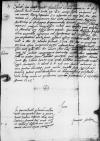List #189
Jan FERBER do Ioannes DANTISCUSPiotrków, 1523-10-23
Rękopiśmienne podstawy źródłowe:
Publikacje:
| ||||||||||||||||
Tekst + aparat krytyczny + komentarzZwykły tekstTekst + komentarzTekst + aparat krytyczny
Nobili domino
In Golmb or Golinb or Colmb⌈GolmbGolmb or Golinb or Colmb⌉ in ripa
Salutem.
Feci, quod iussisti, carissime mi domine Dantisce, et ob id famulum hunc meum mitto, ut Dominatio Tua certior facta, quamprimum ad nos veniat, nam stipendium D(ominationi) or D(ominationis)⌈D(ominationi)D(ominationi) or D(ominationis)⌉ T(uae) ademptum non esse, ipsa
Advenerunt huc ante adventum meum magister Ambrosius et Philippus Angermunde, nuntii
Quae alia
Vale meque ama ac quantocius venias.
Tuus
Postscript:
In parrochiali Gdanensi nullus erit competitor. Heri a patre meo habui litteras. Alia coram latius. Avenam hic emam vel in Wolbors, difficile enim esset tanto itinere equos fatigare.


 BCz, 243, p. 18
BCz, 243, p. 18